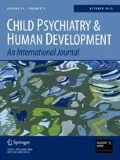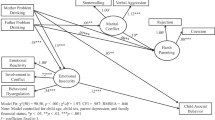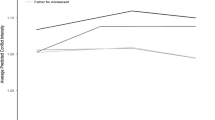Abstract
The personality characteristics of children of exposed to parental problem drinking have been of interest to clinicians and researchers for several decades, but personality research on this population often focuses on identifying a unique cluster of adult personality traits. The current study adopts a cutting-edge dimensional approach to understanding personality pathology as extreme variants of the five factor model, and examines pathways of risk to personality pathology through marital conflict and emotional insecurity. Participants were 199 two-parent families with a child between the ages of 6 and 12 years. Parents completed questionnaire measures of their problem drinking, marital conflict, child emotional insecurity (i.e., emotional reactivity to conflict), and child maladaptive personality traits. Structural equation models found an indirect pathway from mother and father problem drinking to pathological child disagreeableness, introversion, emotional instability, and compulsivity via greater mother destructive marital conflict behavior and child emotional reactivity to conflict. There was also some evidence that this pathway of effects was stronger for girls than for boys. Findings support the use of a dimensional approach to understanding maladaptive personality among individuals exposed to parental problem drinking.


Similar content being viewed by others
References
Lipari RN, Van Horn SL (2017) Children living with parents who have a substance use disorder. The CBHSQ report: August 24, 2017. Center for Behavioral Health Statistics and Quality, Substance Abuse and Mental Health Services Administration, Rockville, MD.
McKetta S, Keyes KM (2019) Heavy and binge alcohol drinking and parenting status in the United States from 2006 to 2018: an analysis of nationally representative cross-sectional surveys. PLoS Med 16(11):1–24
Wegscheider S (1981) Another chance: hope and health for the alcoholic family. Science and Behavior Books, Palo Alto
Woititz JG (1983) Adult children of alcoholics. Health Communications Inc, Hollywood
Logue MB, Sher KJ, Frensch PA (1992) Purported characteristics of adult children of alcoholics: a possible" Barnum effect". Prof Psychol 23(3):226
Lyon MA, Seefeldt RW (1995) Failure to validate personality characteristics of adult children of alcoholics: a replication and extention. Alcohol Treat Q 12(3):69–85
Seefeldt RW, Lyon MA (1992) Personality characteristics of adult children of alcoholics. J Couns Dev 70:588–593
Hinrichs J, DeFife J, Westen D (2011) Personality subtypes in adolescent and adult children of alcoholics: a two part study. J Nerv Ment Dis 199(7):487
McCrae RR, Costa PT Jr (1985) Updating Norman’s “adequate taxonomy”: intelligence and personality dimensions in natural language and in questionnaires. J Pers Soc Psychol 49:710–721
Morgan PT, Desai RA, Potenza MN (2010) Gender-related influences of parental alcoholism on the prevalence of psychiatric illnesses: analysis of the National Epidemiologic Survey on Alcohol and Related Conditions. Alcoholism 34(10):1759–1767
Alterman AI, Bedrick J, Cacciola JS, Rutherford MJ, Searles JS, McKay JR, Cook TG (1998) Personality pathology and drinking in young men at high and low familial risk for alcoholism. J Stud Alcohol 59(5):495–502
Beaudoin CM, Murray RP, Bond J Jr, Barnes GE (1997) Personality characteristics of depressed or alcoholic adult children of alcoholics. Pers Individ Differ 23(4):559–567
Jacob T, Windle M (2000) Young adult children of alcoholic, depressed and nondistressed parents. J Stud Alcohol 61(6):836–844
Larkins JM, Sher KJ (2006) Family history of alcoholism and the stability of personality in young adulthood. Psychol Addict Behav 20(4):471
Sorocco KH, Carnes NC, Cohoon AJ, Vincent AS, Lovallo WR (2015) Risk factors for alcoholism in the Oklahoma Family Health Patterns project: impact of early life adversity and family history on affect regulation and personality. Drug Alcohol Depend 150:38–45
Knowles EE, Schroeder DA (1990) Personality characteristics of sons of alcohol abusers. J Stud Alcohol 51(2):142–147
Martin ED, Sher KJ (1994) Family history of alcoholism, alcohol use disorders and the five-factor model of personality. J Stud Alcohol 55(1):81–90
Redgrave GW, Coughlin JW, Heinberg LJ, Guarda AS (2007) First-degree relative history of alcoholism in eating disorder inpatients: relationship to eating and substance use psychopathology. Eat Behav 8(1):15–22
Coleman FL, Frick PJ (1994) MMPI-2 profiles of adult children of alcoholics. J Clin Psychol 50(3):446–454
Harman MJ, Armsworth MW, Hwang C, Vincent KR, Preston MA (1995) Personality adjustment in college students with a parent perceived as alcoholic or nonalcoholic. J Couns Dev 73:459–462
Hesselbrock MN, Hesselbrock VM (1992) Relationship of family history, antisocial personality disorder and personality traits in young men at risk for alcoholism. J Stud Alcohol 53(6):619–625
Clark LA (2007) Assessment and diagnosis of personality disorder: Perennial issues and an emerging reconceptualization. Annu Rev Psychol 57:277–257
Krueger RF, Markon KE (2014) The role of the DSM-5 personality trait model in moving toward a quantitative and empirically based approach to classifying personality and psychopathology. Annu Rev Clin Psychol 10:477–501
Widiger TA, Trull TJ (2007) Plate tectonics in the classification of personality disorder: shifting to a dimensional model. Am Psychol 62:71–83
Haigler ED, Widiger TA (2001) Experimental manipulation of NEO PI-R items. J Pers Assess 77:339–358
De Clercq B, De Fruyt F (2012) A five-factor model framework for understanding childhood personality disorder antecedents. J Pers 80(6):1533–1563
Keller PS, El-Sheikh M, Keiley M, Liao PJ (2009) Longitudinal relations between marital aggression and alcohol problems. Psychol Addict Behav 23(1):2
Quigley BM, Leonard KE (2000) Alcohol and the continuation of early marital aggression. Alcoholism 24(7):1003–1010
Stuart GL, Ramsey SE, Moore TM, Kahler CW, Farrell LE, Recupero PR, Brown RA (2003) Reductions in marital violence following treatment for alcohol dependence. J Interpers Violence 18(10):1113–1131
Eiden RD, Molnar DS, Colder C, Edwards EP, Leonard KE (2009) A conceptual model predicting internalizing problems in middle childhood among children of alcoholic and nonalcoholic fathers: The role of marital aggression. J Stud Alcohol Drugs 70(5):741–750
Keller PS, Cummings EM, Davies PT, Mitchell PM (2008) Longitudinal relations between parental drinking problems, family functioning, and child adjustment. Dev Psychopathol 20(1):195–212
Davies PT, Cummings EM (1994) Marital conflict and child adjustment: An emotional security hypothesis. Psychol Bull 116(3):387
Cummings EM, Davies PT (2011) Marital conflict and children: an emotional security perspective. Guilford Press, New York
Keller PS, Gilbert LR, Koss KJ, Cummings EM, Davies PT (2011) Parental problem drinking, marital aggression, and child emotional insecurity: A longitudinal investigation. J Stud Alcohol Drugs 72(5):711–722
Keller PS, Cummings EM, Davies PT, Lubke G (2007) Children’s behavioural reactions to marital conflict as a function of parents’ conflict behaviours and alcohol problems. Eur J Dev Psychol 4(2):157–177
Cicchetti D (2016) Socioemotional, personality, and biological development: illustrations from a multilevel developmental psychopathology perspective on child maltreatment. Annu Rev Psychol 67:187–211
Dargis M, Koenigs M (2017) Witnessing domestic violence during childhood is associated with psychopathic traits in adult male criminal offenders. Law Hum Behav 41(2):173
Khan A, McCormack H, Bolger E, McGreenery C, Teicher M (2017) 485. Childhood maltreatment and normal adult personality traits: evidence for developmental sensitive periods of exposure. Biol Psychiatry 81(10):S197–S198
Lund JI, Schmidt LA, Saigal S, Van Lieshout RJ (2017) Personality characteristics of adult survivors of preterm birth and childhood sexual abuse. Pers Individ Differ 117:101–105
Winsper C, Hall J, Strauss VY, Wolke D (2017) Aetiological pathways to borderline personality disorder symptoms in early adolescence: childhood dysregulated behaviour, maladaptive parenting and bully victimisation. Borderline Pers Disord Emot Dysregul 4(1):1–10
Saunders JB, Aasland OG, Babor TF, De la Fuente JR, Grant M (1993) Development of the alcohol use disorders identification test (AUDIT): WHO collaborative project on early detection of persons with harmful alcohol consumption-II. Addiction 88(6):791–804
De Clercq B, De Fruyt F, Van Leeuwen K, Mervielde I (2006) The structure of maladaptive personality traits in childhood: a step toward an integrative developmental perspective for DSM-V. J Abnorm Psychol 115(4):639–657
Kerig PK (1996) Assessing the links between interparental conflict and child adjustment: the conflicts and problem-solving scales. J Fam Psychol 10:454–473
Davies PT, Forman EM, Rasi JA, Stevens KI (2002) Assessing children’s emotional security in the interparental relationship: the security in the interparental subsystem scales. Child Dev 73(2):544–562
Kline RB (2016) Principles and practice of structural equation modeling. Guilford, New York
Sobel ME (1982) Asymptotic confidence intervals for indirect effects in structural equation models. Sociol Methodol 13:290–312
Brown W, Leonard KE (2017) Does alcohol cause violence and aggression? In: Sturmey P (ed) The Wiley handbook of violence and aggression. Wiley, pp 1–13
Quigley BM, Levitt A, Derrick JL, Testa M, Houston RJ, Leonard KE (2018) Alcohol, self-regulation and partner physical aggression: actor-partner effects over a three-year time frame. Front Behav Neurosci 12:130
Koss KJ, George MR, Bergman KN, Cummings EM, Davies PT, Cicchetti D (2011) Understanding children’s emotional processes and behavioral strategies in the context of marital conflict. J Exp Child Psychol 109(3):336–352
Wearden A, Peters I, Berry K, Barrowclough C, Liversidge T (2008) Adult attachment, parenting experiences, and core beliefs about self and others. Pers Individ Differ 44(5):1246–1257
Noftle EE, Shaver PR (2006) Attachment dimensions and the big five personality traits: associations and comparative ability to predict relationship quality. J Res Pers 40(2):179–208
Ahmad-Nielsen EB, Andersen NG, Andersen K, Nielsen AS, Mellentin AI (2019) The degree of multidimensional severity of alcohol use disorder among treatment-seeking patients: is there an additive effect of parental alcohol use disorder? Eur Addict Res 25(4):191–197
Sidal NE, Kose T (2019) Parental alcohol use and children’s mental health: the case of Turkey. Int J Behav Healthc Res 7(1):65–76
Husky MM, Keyes K, Hamilton A, Stragalinou A, Pez O, Kuijpers R, Kovess-Masfety V (2017) Maternal problem drinking and child mental health. Subst Use Misuse 52(14):1823–1831
Nattala P, Murthy P, Weiss MG, Leung KS, Christopher R (2020) Experiences and reactions of adolescent offspring to their fathers’ heavy drinking: a qualitative study from an urban metropolis in India. J Ethn Subst Abuse 1–20
Pisinger VS, Hawton K, Tolstrup JS (2018) Self-injury and suicide behavior among young people with perceived parental alcohol problems in Denmark: a school-based survey. Eur Child Adolesc Psychiatry 27(2):201–208
Zouini B, Sfendla A, Senhaji M, Råstam M, Kerekes N (2019) Somatic health and its association with negative psychosocial factors in a sample of Moroccan adolescents. SAGE Open Med 7:2050312119852527
Sandler I, Miles J, Cookston J, Braver S (2008) Effects of father and mother parenting on children’s mental health in high- and low-conflict divorces. Fam Court Rev 46(2):282–296
Kuppens S, Ceulemans E (2019) Parenting styles: a closer look at a well-known concept. J Child Fam Stud 28(1):168–181
Cristea IA, Gentili C, Cotet CD, Palomba D, Barbui C, Cuijpers P (2017) Efficacy of psychotherapies for borderline personality disorder: a systematic review and meta-analysis. JAMA Psychiat 74(4):319–328
Miller-Graff LE, Cummings EM, Bergman KN (2016) Effects of a brief psychoeducational intervention for family conflict: constructive conflict, emotional insecurity and child adjustment. J Abnorm Child Psychol 44(7):1399–1410
Bleidorn W, Kandler C, Caspi A (2014) The behavioural genetics of personality development in adulthood—classic, contemporary, and future trends. Eur J Pers 28(3):244–255
Penke L, Jokela M (2016) The evolutionary genetics of personality revisited. Curr Opin Psychol 7:104–109
Kenna GA, Zywiak WH, Swift RM, McGeary JE, Clifford JS, Shoaff JR, Leggio L (2014) Ondansetron and sertraline may interact with 5-HTTLPR and DRD4 polymorphisms to reduce drinking in non-treatment seeking alcohol-dependent women: exploratory findings. Alcohol 48(6):515–522
Acknowledgements
This study was funded by a grant from the National Institute of Child Health and Human Development (R21HD062833).
Funding
Funding was provided by Eunice Kennedy Shriver National Institute of Child Health and Human Development (Grant Number R21HD062833).
Author information
Authors and Affiliations
Corresponding author
Ethics declarations
Conflict of interest
The authors have no conflicts of interest to disclose.
Additional information
Publisher's Note
Springer Nature remains neutral with regard to jurisdictional claims in published maps and institutional affiliations.
Rights and permissions
About this article
Cite this article
Keller, P.S., Widiger, T.A. & El-Sheikh, M. Parental Problem Drinking and Maladaptive Personality Features in Children: The Role of Marital Conflict. Child Psychiatry Hum Dev 54, 1336–1346 (2023). https://doi.org/10.1007/s10578-022-01340-9
Accepted:
Published:
Issue Date:
DOI: https://doi.org/10.1007/s10578-022-01340-9




